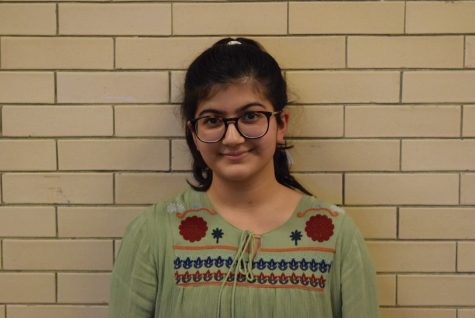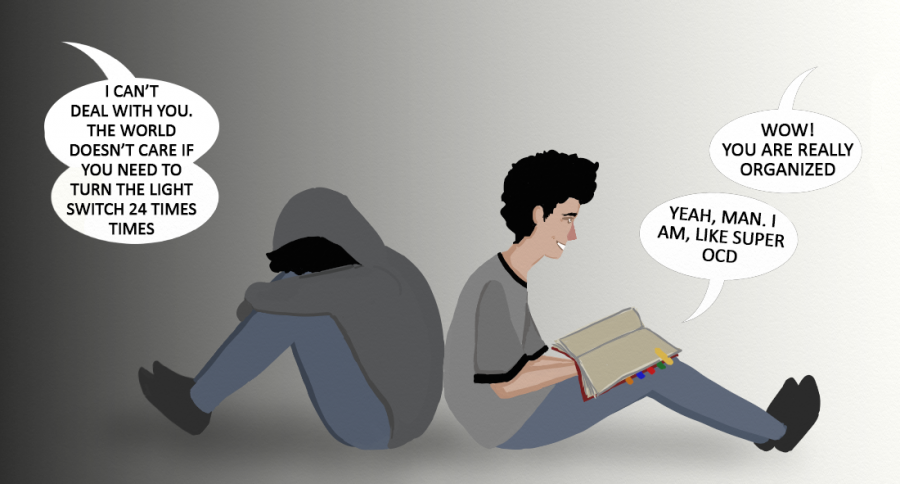‘Why are you so incorrect?’
Many of us, at some point in our lives, have labeled a teacher with mood swings “bipolar,” or a sibling with neat habits “OCD,” or the girl who refused a cookie “anorexic,” or an airhead friend “retarded.” We use these words every day incorrectly, to describe others, and even to describe ourselves. The time to actually think about these words and understand what they mean is long overdue.
What we may not understand is that these words actually mean something– that they are mental health disorders. Labeling someone as “retarded” who is actually not mentally retarded at all, minimizes the significance of the word and the people who actually have the disorder.
“I think that there is a desire for shock value and using that kind of language makes you sound professorial,” Dr. Gilson, Lane’s student psychologist, said. “Superlatives are part of the routine, I think, some teenagers just talk that way. But you need to be sensitive about it. I could tell you that when I was a teen, you’d say ‘you’re a retard,’ or ‘you’re faggy,’ and you didn’t really understand what that meant. Part of it is just because of your age, you haven’t met a wide variety of people.”
But not only do teenagers turn these terms into hyperboles, adults do this too. According to BBC News, the Observer newspaper called TV presenter Gok Wan’s fashion “schizophrenic,” and had to apologize for it in December 2010. In September 2011, the International Monetary Fund claimed that the global economy is “bipolar.” A writer for Sunday Times, Robert Harris, reported that Gordon Brown and Richard Nixon had “political Asperger’s syndrome.”
For this generation, this is another sort of embarrassment. Whether it is a hyperbole, or a metaphor, it is taking something that is serious, and creating an atmosphere where it is a joke. That atmosphere, most of the time, is right where we all come to become educated.
“Teenagers are very egocentric, and they are supposed to be,” Gilson said. “They are hyper-concerned about their appearance, how they’re perceived, how they fit in, so being labeled can have horrible effects. But it’s sort of a paradox and can have the opposite effect too. It can make a term seem all-okay.”
It is safe to say that never are mental health disorders “all-okay.” There are actually the complete opposite. Having depressive and bipolar tendencies, anxiety from stress, the need to perfect something to the point where you lose sleep, and occasional panic attacks are something many students are familiar with. In fact, according to the National Alliance on Mental Illness, or NAMI, 20 percent of youth ages 13-18 are living with a mental health condition every year.
Also according to NAMI, in the United States, suicide is the second leading cause of death for youth and 90 percent of teens who have committed suicide were proven to have had a mental illness. The problem is that instead of seeking help, or helping each other, many see it as a joke.
“I advise teens to be aware of their friends who chase down the drama, because that is just very exhausting,” Gilson said. “It’s not the kind of people you want to be around to support your mental health. You can become a really good consumer of the languages you hear around you. And if those words are accusatory or negative, it’s not helpful at all.”
We put a negative connotation behind the words, “Obsessive-Compulsive Disorder,” “anorexia,” “retarded,” “bipolar.” But the truth is, as critical of an impact these words have on those who have these disorders, they become an embarrassment for some.
“Today we saw four students, but everyday is different,” Gilson said. “We revised a student’s 504 Plan, another was a perfectionist who really struggles with high demands on herself and cannot tolerate being wrong, which is a learning process. I worked with another student who has severe ADHD symptoms, and another student here was just checked out from the hospital, because of panic episodes in school. A teacher referred me to a student with extreme shyness and is also failing some classes, so I talked to her about some basic skills to help her manage her course load but also develop herself with other skills. That’s just an assortment of what we have today, but every day is different.”
Mental health, especially in schools, can be easily tampered with. We must learn to be gentle with each other and with ourselves, because although many of us feel like a number, we have the utmost potential.
“I view mental health as a continuum,” Gilson said. “Every single one of us, more often than not, can manage anxiety or significant stress on our own. You can take a break, get quality sleep, whatever helps you. And sometimes we’re a little vulnerable and feel like we’ve been dumped on, so we’ll talk to a friend and our families, or our counselors in school. But, if you’re feeling isolated and withdrawn from your social relationships, from your family, if you’re having obsessive thoughts about school, anything that is affecting your sleep patterns, your appetite, anything that is affecting your lifestyle, that is a disorder.”
Disorders are treatable, but only if one seeks the help for it. And if one cannot, it is up to the others around that person to stand up, and help them. Help them, because mental health is not a joke, because you know that high school is difficult as is, and because we all can use it sometimes.
Your donations directly fund the Lane Tech student journalism program—covering essential costs like website hosting and technology not supported by our school or district. Your generosity empowers our student reporters to investigate, write, and publish impactful stories that matter to our school community.
This website is more than a publishing platform—it's an archive, a research tool, and a source of truth. Every dollar helps us preserve and grow this resource so future students can learn from and build on the work being done today.
Thank you for supporting the next generation of journalists at Lane Tech College Prep!

Anum Shafqat is the Editor-in-Chief of The Warrior. She has been pursuing journalism in high school for three years. With a love for television, red velvet...

